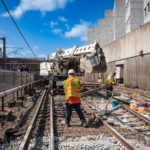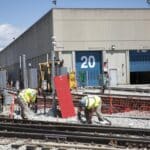
Driscoll Cites Mass. as ‘Model’ at National Transit Conference
Before a national audience of transit leaders on Monday, Lt. Gov. Kim Driscoll offered an optimistic rebranding of Massachusetts’ troubled public transit systems.

Before a national audience of transit leaders on Monday, Lt. Gov. Kim Driscoll offered an optimistic rebranding of Massachusetts’ troubled public transit systems.

MBTA overseers on Tuesday unanimously approved the latest five-year plan to invest in systemwide improvements, embracing a $9.8 billion roadmap that one watchdog group called a “nuts and bolts” approach.

The hiring blitz at the T will keep going full steam ahead. Or it probably will, at least if the MBTA’s final budget looks like the preliminary version that’s up for a vote Thursday.

With the subway cars on its biggest line so old that it’s having to run shorter trains to prevent putting broken trains on the tracks, the fate of CRRC-made trains is a vital concern.

But problems on the Red Line Monday morning cast a shadow over officials’ celebratory mood as they gathered for a press conference to promote the elimination of all slow zones on the MBTA subway network “for the first time in 20 years.”

New data seems to suggest that the MBTA’s year-long campaign of subway maintenance shutdowns has worked.

Does it seem like your T ride is improving? It actually might be. Statistics show the transit agency is turning a corner on subway slow zones, speeds on the Blue and Orange Lines and the largest workforce in years that resulting in better service.

As Boston’s economy adapts to the post-pandemic working and living environment, Jim Rooney has been an outspoken critic of threats to the region’s economic competitiveness, from problems with the T to office vacancies.

MBTA General Manager Phillip Eng is beginning to make the case that the transit authority is a reliable transportation option.

After reopening the core of its Orange Line subway Friday following a nine-day closure for repairs, the MBTA says it’s made “significant progress” in eliminating delays caused by track in disrepair.

In the second year of spending from a new revenue source tied to the state’s highest earners, Gov. Maura Healey plans to allocate the growing pot of money on MBTA fare relief for low-income individuals and leveraging funds to make capital repairs across the state’s higher education institutions.

Healey came into office with the MBTA in disarray. And while she’s overseen a hiring blitz and new plans to fix tracks in disrepair, she’s raised eyebrows in recent weeks with comments that suggest an interest in reopening debate on how the state funds transportation.

Contractors responsible for fixing narrow rails on the MBTA’s newest stretch of tracks requested a second extension for their project that could push its endpoint into the new year, the agency’s top boss said Wednesday.
Jingle bells, jingle bells, please no catastrophes. Oh what fun it’d be to find enough funding for the T!

Talks are already underway between Gov. Maura Healey, state lawmakers and unnamed “stakeholders” about what kinds of taxes and fees are necessary to address a massive list of infrastructure needs at the MBTA, Healey said Thursday.

Gov. Maura Healey said Monday that she believes the MBTA can be “safe, reliable, running on time, [and] running at speeds that actually get people there quickly” by the end of next year, and said Monday that revenue for the transportation system is “going to be the subject of a lot of discussion.”

The MBTA will need almost $15 billion more to modernize and fix its trains, tracks, facilities and equipment, the transit agency announced Thursday afternoon.

The MBTA is planning to unleash a year-long campaign of maintenance shutdowns to eliminate the slow zones and other track headaches that have bedeviled subway riders for over a year.

Top MBTA officials told lawmakers they are optimistic about their progress addressing woes across the system, but when it came to some of the biggest questions facing the agency, they had little to share.

People will see a “different T one year from now,” but T board chair Tom Glynn and General Manager Phil Eng indicated the public won’t see a difference in just two months’ time.